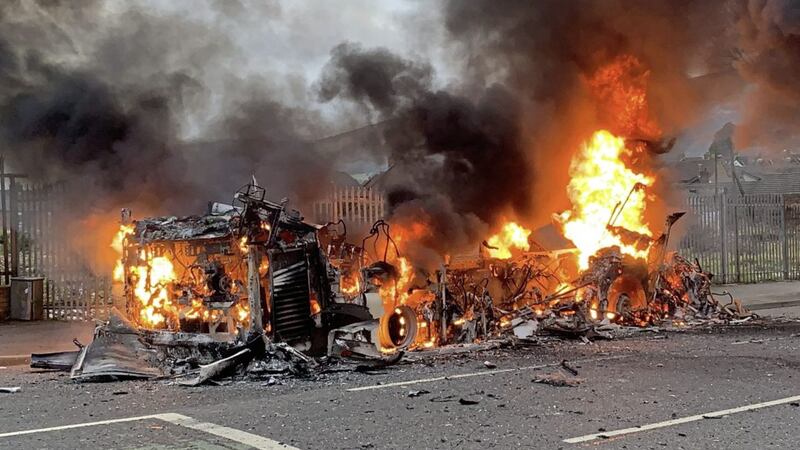Like it or not, one response to loyalist violence that must be seriously considered is making concessions towards it.
After decades of yielding to violence from all quarters, involving horrendous compromises for an imperfect peace, it should be inconceivable to risk restarting the Troubles over inspecting packets of ham at Larne.
We are not even inspecting ham for ourselves but for the EU, which claims without reason or evidence that its single market would otherwise be swamped via circuitous smuggling of food through Britain and Northern Ireland.
Could Jonathan Swift have dreamed up a more absurd reason for conflict? Inspecting the big or little end of eggs, perhaps?
At some point we will have to confront the moral squalor of giving in to violence but that moment is hardly now, when so little might be required to prevent violence. Rather, it would be immoral to prioritise hypothetical ham over life and property.
This does not mean scrapping or renegotiating the protocol, let alone installing a hard border. It does mean maximum mitigation of the sea border, as its own terms allow.
Many republicans say Brexit technicalities have little to do with loyalist violence. What is there to lose by finding out?
**
Organising a ‘protest’ at an interface guarantees trouble.
However, loyalism’s official protest plans for the coming months are centred on unnotified parades in unionist-majority areas.
If police move in to prevent these unlawful demonstrations that will also ensure trouble, as has already happened in Ballymena.
Standing back to take evidence for later arrests still makes officers a target and helps manufacture grievances about two-tier policing.
In fact, any police presence plays into the hands of those who want to engineer a confrontation.
So this is another loyalist threat where the authorities must consider a tactical retreat. If an unnotified parade takes place in a unionist area, what is at stake apart from avoiding a confrontation?
**
Much commentary on the rioting has focused on long-standing social and economic factors, such as persistent deprivation and educational under-achievement.
Any analysis extending beyond personal responsibility also needs to consider the epidemic. Nobody looking at Northern Ireland from any objective distance could fail to wonder at the effect of locking a divided society down for a year amid other political pressures. It cannot be a coincidence that everything has blown up just as restrictions are about to lift. There is a dangerous feedback loop in this mechanism, as loyalists increasingly suspect they are being locked down just keep them off the streets. The executive has not helped by being so opaque about its criteria for relaxing restrictions.
**
Arlene Foster has reversed her refusal to meet the chief constable, a position that was always going to put her at odds with most of the unionist electorate during a well-foreseen upsurge in violence.
UUP leader Steve Aiken has retracted his claim the PSNI was “marking its own homework” by having its handling of the Bobby Storey funeral investigated by Her Majesty’s Inspectorate of Constabulary (HMIC).
“We fully support the HMIC in its work,” he told the assembly. “Its professionalism and ability to investigate impartially is without any doubt.”
HMIC is best known in Northern Ireland for its 2013 report into the Historical Enquiries Team (HET), which damned the Troubles legacy body for not performing full investigations, although HET’s whole rationale was that it would not perform such investigations pending a legacy agreement. The PSNI accepted HMIC’s debatable criticism and shut HET down, as it wanted to do anyway to save money. So while the inspectorate is independent, it has shown itself to be easily used.
**
Let us take good news where we find it. Marks & Spencer has announced it is opening a new food store in Coleraine, investing £2.5 million and creating 70 jobs. This is a timely sign that business expects protocol problems to be solved. No food retailer is considered more vulnerable to the sea border than Marks & Spencer, as such a high proportion of its product lines are pre-packaged own-brand meat and dairy, all arriving on a relatively small number of mixed containers from distribution centres in Britain.
It is tempting to quip that rioting will now be less likely in middle-class areas, although Marks & Spencer has also recently invested in food halls in Carrickfergus and Newtownabbey.
**
SDLP infrastructure minister Nichola Mallon and Irish transport minister Eamon Ryan have launched an all-Ireland strategic rail review, as pledged in New Decade, New Approach. A tiny change of wording is significant. New Decade, New Approach referred to “high speed rail” from Derry to Cork - a Boris bridge fantasy. The review refers to “high/higher speed rail”, which is entirely realistic. Higher speed rail is a specific term in transport policy meaning incremental improvements in existing tracks to deliver speeds up to 125 mph, rather than building TGV-type lines from scratch. There is never going to be a TGV from Derry to Belfast but there can be a fast, frequent conventional service. There might one day be a TGV from Belfast to Dublin - where it can join the tunnel to Wales.









